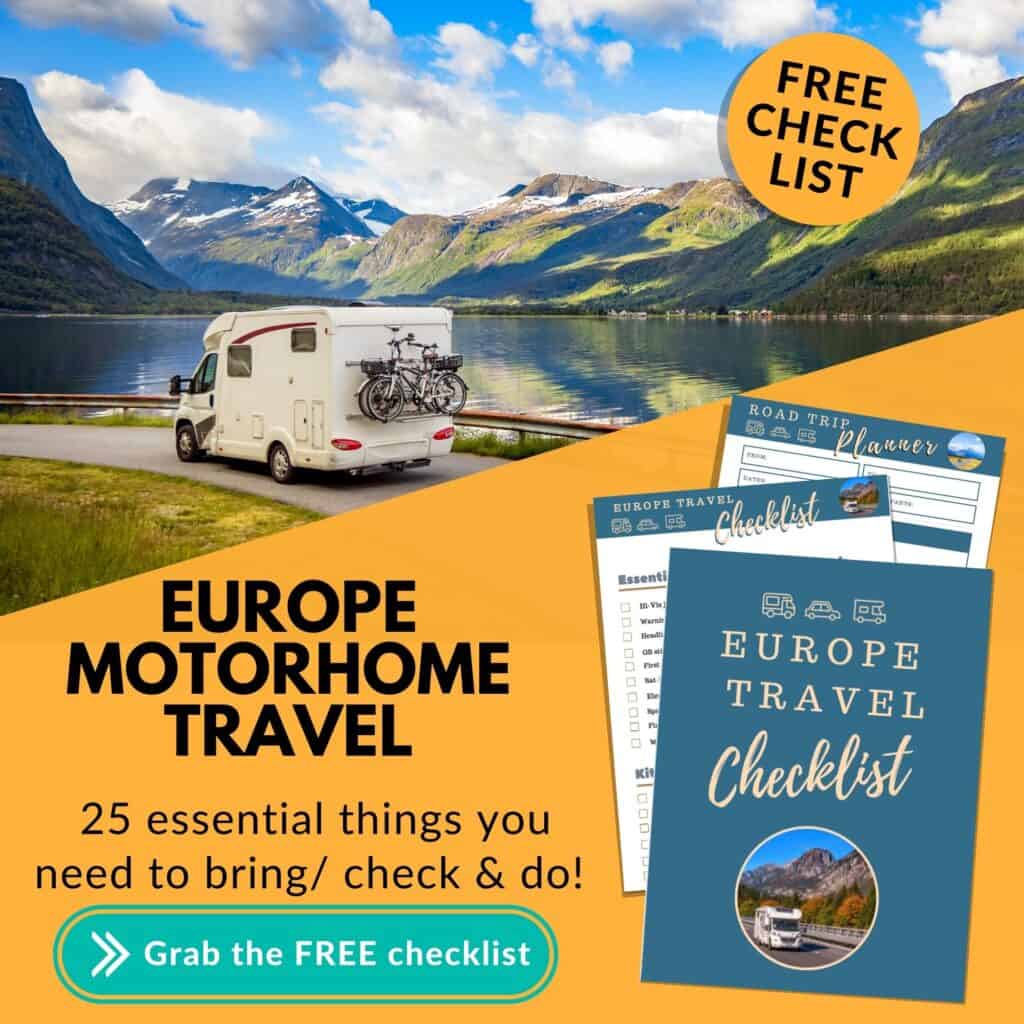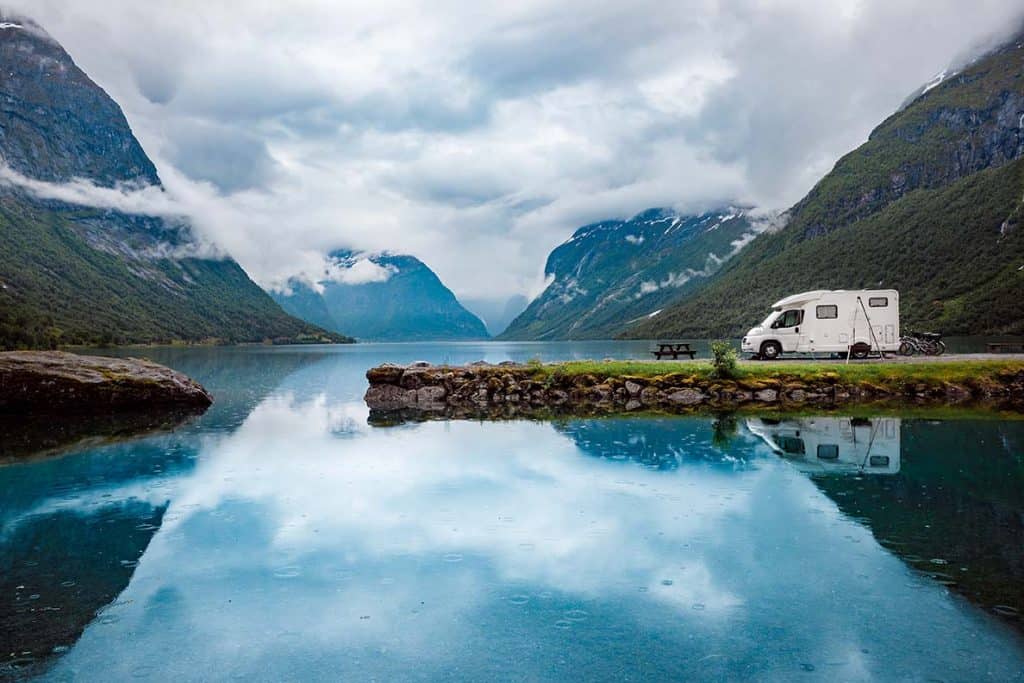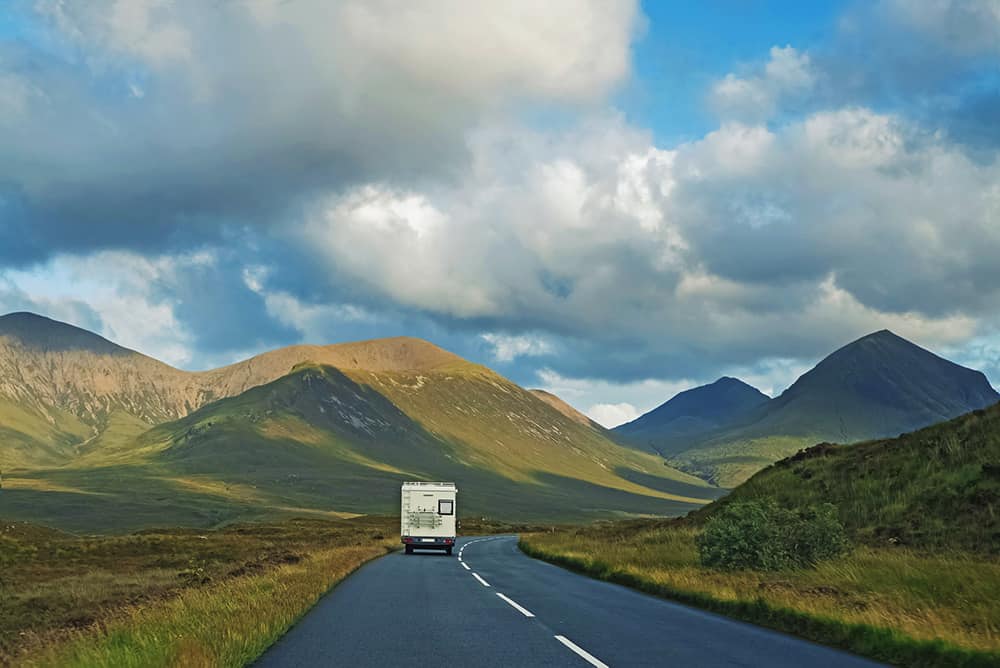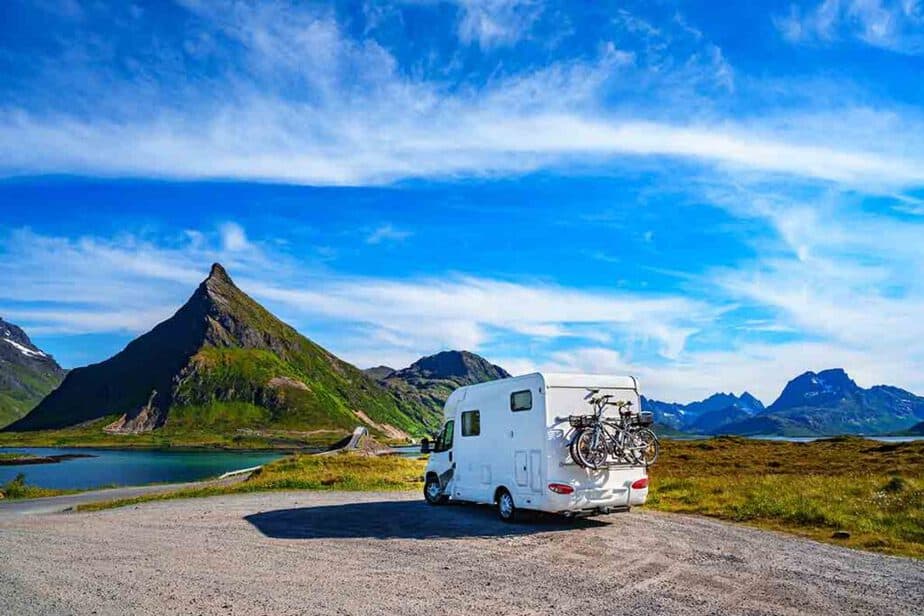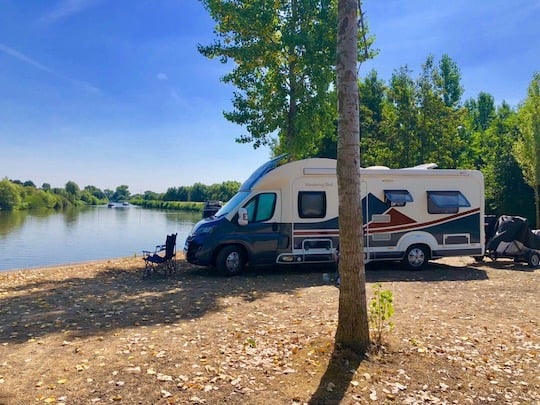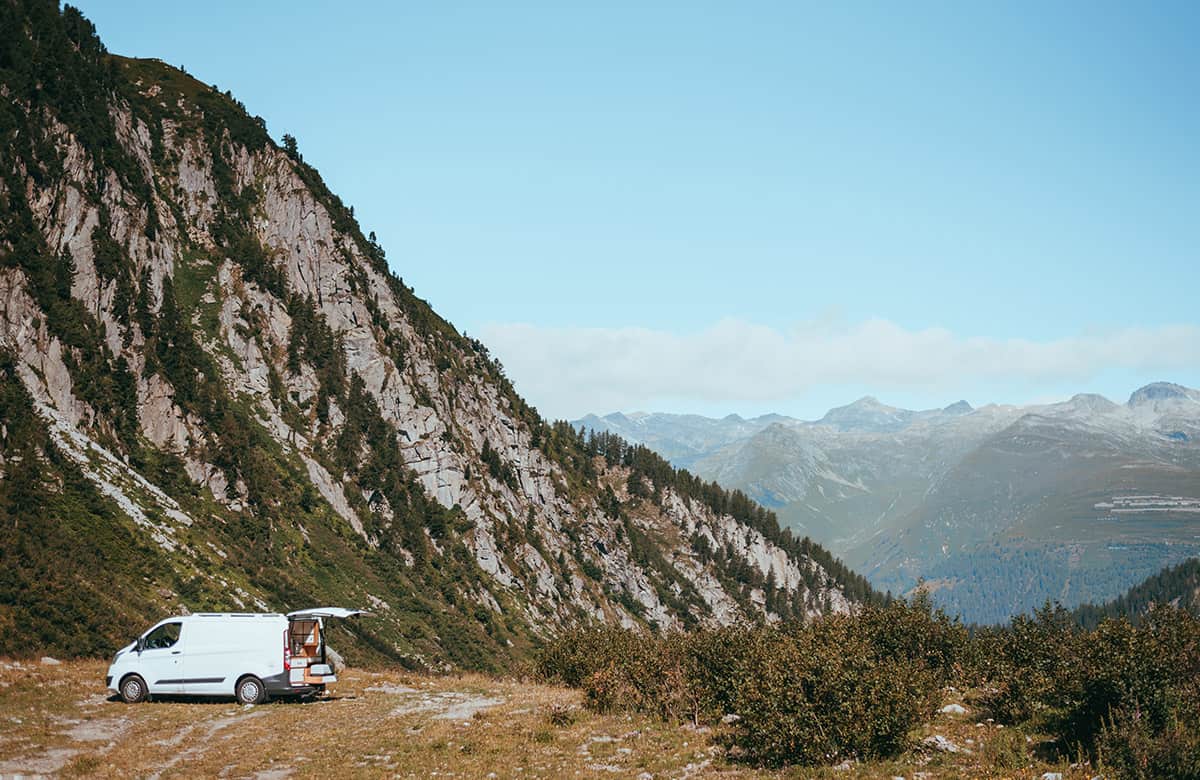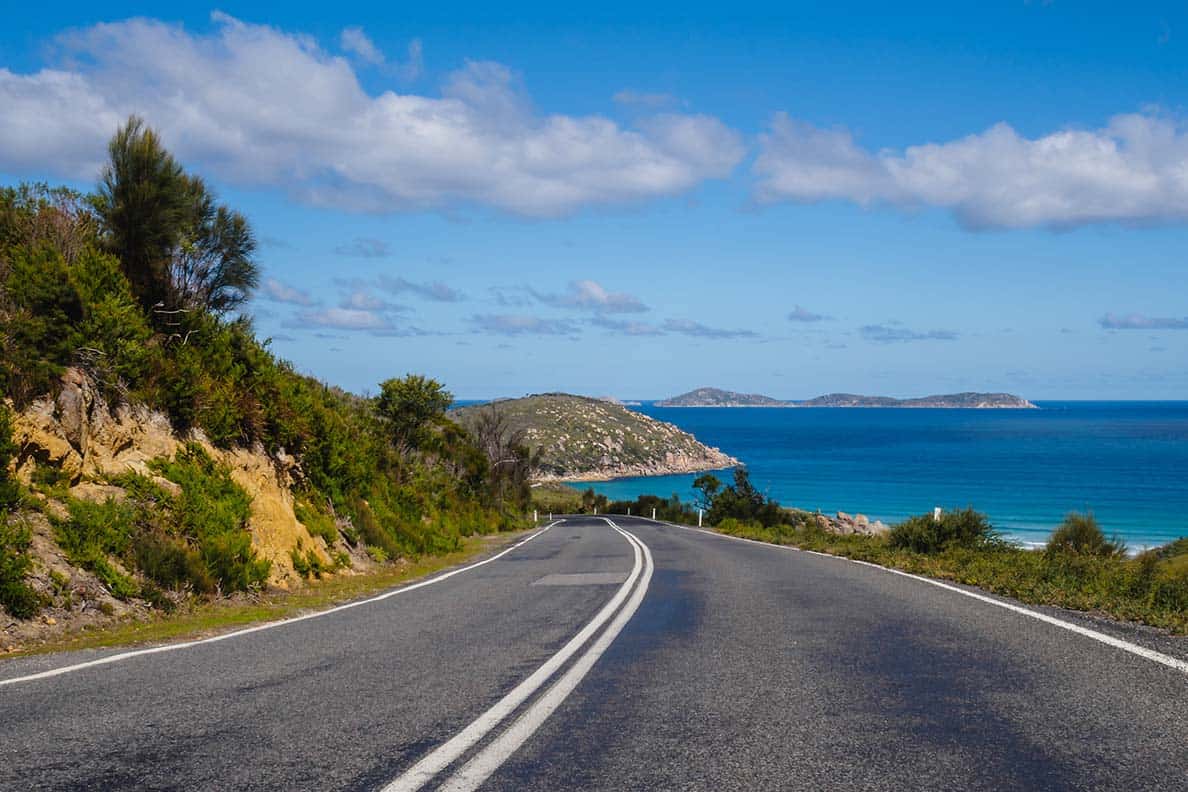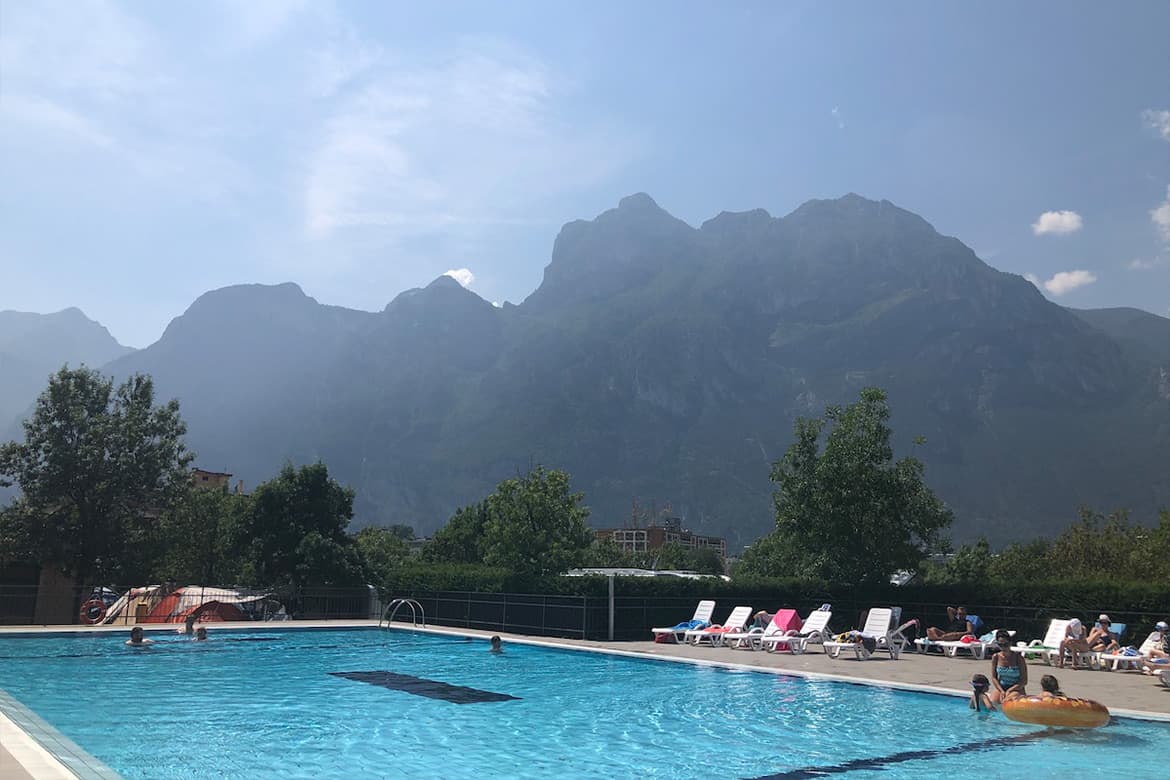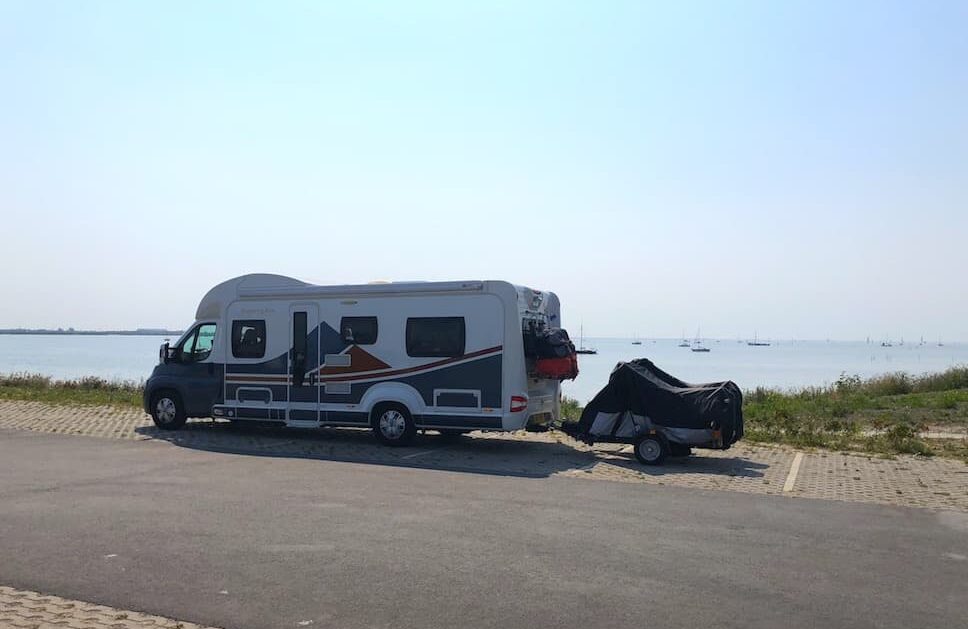Motorhoming & Campervanning in Portugal- Ultimate Guide
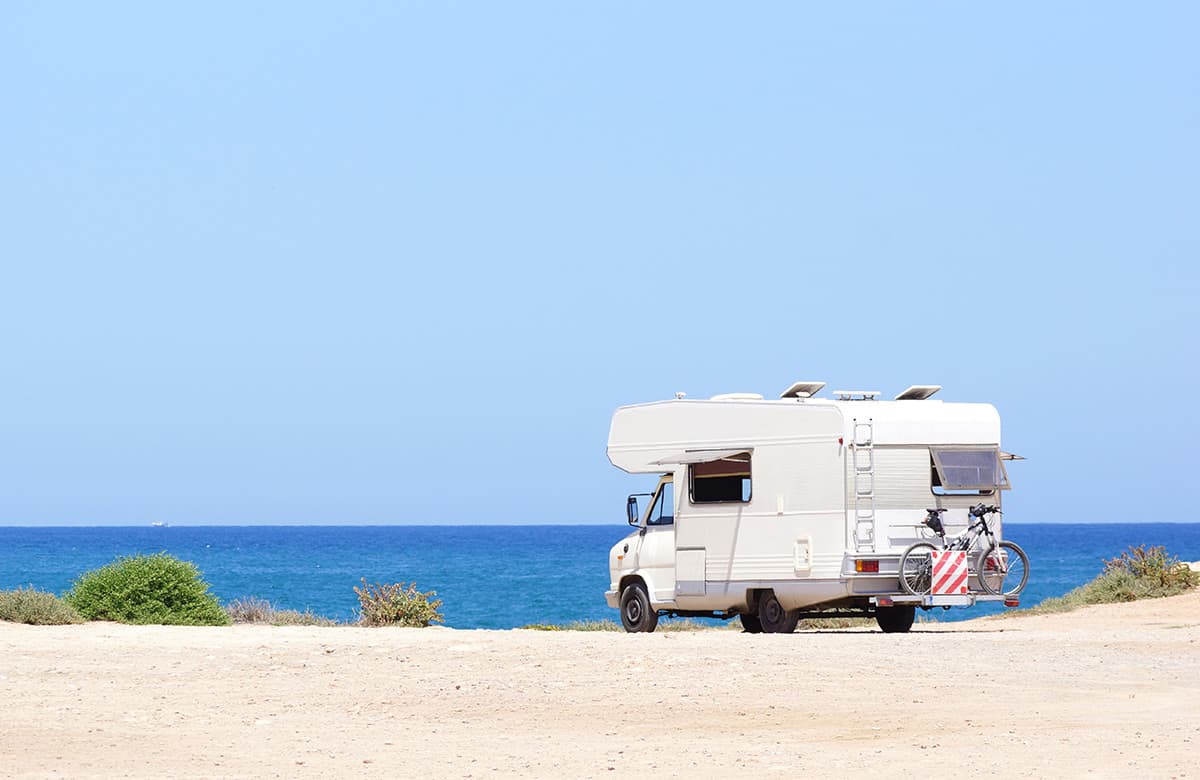
Planning a motorhome or campervan trip to Portugal? Want to see some of the most breathtaking places in Europe? Here’s everything you need to know to go campervanning or motorhoming in Portugal, including routes and places to visit.
Don’t forget to download your FREE Europe motorhome travel checklist below to help you plan your Portugal road trip.
*We work hard to make this the best motorhome travel blog and road trip website possible, full of helpful content for you. The website is supported by our readers, so if you buy through links on this site we may earn a commission- at no extra cost to you. All opinions remain our own.
If you find this post useful, you can also treat us to a coffee – we promise to enjoy it while creating more useful content like this- we might even indulge in a biscuit (or two!)
JUMP AHEAD TO...
Motorhoming in Portugal- why you should go!
Portugal has a little bit of everything- dramatic coastline with sandy beaches, caves, mountains, fantastic cuisine and history. Oh, and wine. Lots and lots of lovely wine. It’s wonderfully traditional and many parts of it still feel utterly untouched by the modern world.
One of the best things about being able to explore Portugal on a motorhoming holiday is that you can see the differences between the regions, try the local cuisine (and wine!) and really get a feel for the country in a short space of time.
It’s also one of the cheapest countries in western Europe, so you can travel on a small budget without much issue.
In this guide, we’re going to share with you everything you need to know to go motorhoming or campervanning in Portugal, including getting to Portugal and planning your route, where to stay (motorhome campsites, aires or wild camping with your camper), some road trip ideas and places to visit, driving tips and other practical advice to help you have an amazing Portuguese road trip.
We’re also going to share some things NOT to do- like use your dash-cam! (Did you know dash-cams are illegal in Portugal?!)
If this is your first campervanning trip to Portugal (or Europe!), don’t forget to grab your free motorhome travel checklist which will help you plan and organise everything you need.
Planning to take your motorhome to Europe?
GUIDE: Stop the overwhelm with our step-by-step guide. Contains eBook, checklists and more. Complete Europe Motorhome Travel Toolkit
CHECKLIST: Don’t forget to grab your FREE Europe motorhome travel checklist HERE
GEAR– If you need any motorhome gear for touring Europe, here’s what we recommend.
Campervanning in Portugal- Where to go
When planning a motorhome trip to Portugal, the first thing you need to do is decide where you’re going (and how long you have for your adventure!)
How long to go for?
If you’re driving from the UK to Portugal (we’ll cover that shortly), you need to allow at least 2 days from arriving in France (by either ferry or Eurotunnel) to get to Portugal. And that’s 2 days of pretty much solid driving (it’s about 15 and a half hours (1013 miles) from Calais to the north-eastern Portuguese border)
We don’t recommend visiting Portugal if you only have a week for your road trip. It’s too far and all you’ll do is drive there and back. Of course, if you’re going to rent a motorhome and fly in, that’s perfectly doable in a week (more on that shortly).
If you have a couple of weeks, you can certainly explore a good chunk of Portugal, but you will be doing a lot of driving unless you stick to just the North of the country.
Portugal isn’t a huge country- it only takes about 7 hours (470miles) to drive from North to South, so once you’re there it’s easy to see a lot in a short space of time.
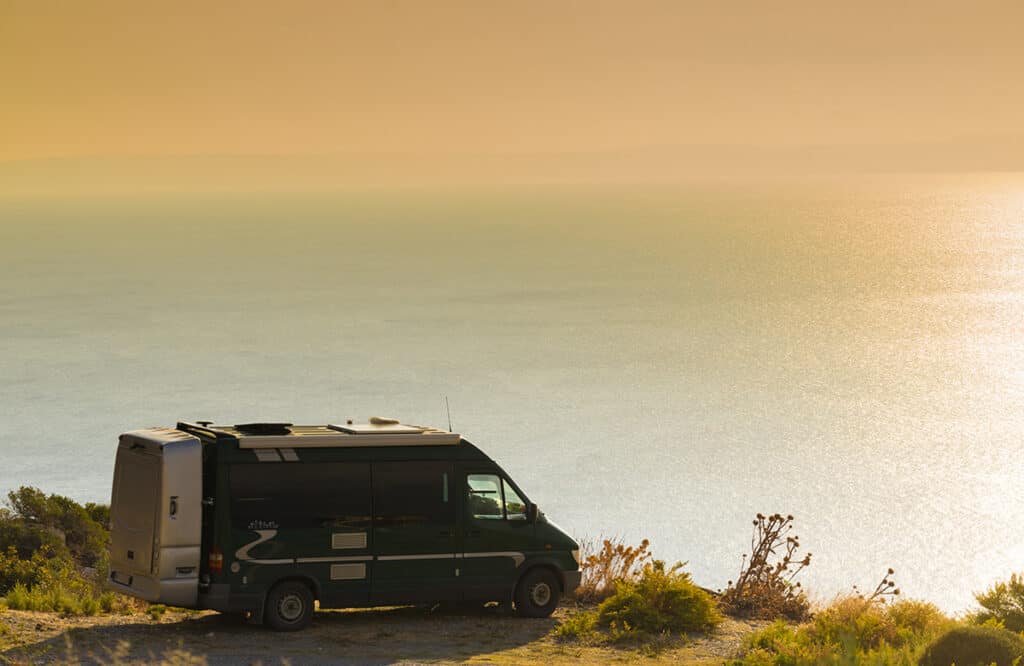
Highlights of a Portugal Motorhoming Holiday
Some of the best places to visit when campervanning in Portugal include:
- The Algarve – the beaches there are some of the best in Europe
- Lisbon – one of Europe’s most historical cities
- Sintra- it really does look like something from a fairytale
- Alentejo National Park- the largest protected coastal Natural Park in Europe
- Porto- one of the oldest ports in the world
- Cape St Vincent- Europe’s most south-westerly point
- Serra Da Estrela- Portugal’s highest mountain range
- Duoro Valley- if you like wine, here’s the place to go
- Megaliths near Évora- these are amazing!
If you enjoy reading books before a trip, here are some we recommend:
See more fun and practical motorhoming books we recommend reading
When to go motorhome touring in Portugal
Portugal has one of the warmest climates in Europe. As such, it’s a magnet for northern Europeans- especially in winter.
Campervanning in Portugal in winter
Portugal is great in winter. It’s one of the warmest places in Europe in February with average temperatures of over 16°C.
The nice thing about campervanning in Portugal during the winter is that most things remain open, as so many tourists still visit, so it doesn’t all shut down like many other countries in Europe. (Of course, some campsites do choose to close, but there are still plenty open all year.)
However, not everywhere in Portugal is warm in winter. Expect snow and skiing in the mountains- especially in Serra Da Estrela (the highest mountain range).
Touring Portugal in summer
For us, summer in Portugal is just too hot. Average temperature in the Algarve in August is 29°C- that’s the AVERAGE. As we don’t have air conditioning in our motorhome, and because we travel with a dog, we try to avoid hot places like this and go motorhoming in Norway or other places with mountains and cooler air.
Also, it gets crowded in summer. Crazy crazy crowded. Beaches are packed and queues for tourist attractions are long. Being crammed in, especially in hot weather, doesn’t appeal to us at all.
Get more tips for summer van life and keep your camper cool
Motorhoming in Portugal in Spring and Autumn
As with most of Europe, Spring and Autumn are perfect times to explore Portugal. The weather is still warm (average of 19.8°C in April and 22°C in October), but the crowds from summer have gone and you might even get stretches of beach all to yourself.
If you want to go hiking in Portugal, this is a great time to visit, especially in Spring when the flowers are blooming.
TOP TIP: If you are travelling outside of peak season, definitely get an ACSI CampingCard– you’ll save a fortune on campsites all over Europe, including Portugal
Driving from the UK to Portugal
Did you know that Portugal and England have the oldest alliance in the world, dating all the way back to 1373?! (Just one of many fun facts about Portugal.)
If you’re planning a campervanning trip to Portugal, there are a couple of options from the UK, assuming you’re bringing your own vehicle (if you’re flying in and hiring, we’ll deal with that shortly.)
There are two ways people get their motorhomes to Portugal- drive through France and Spain or take the ferry to Spain and then drive into Portugal. There are pros and cons to each.
Generally, taking a ferry from the UK is much more expensive than driving through France (depending on the time of year and type of cabin).
New to motorhome or camper travel in Europe? You might find these posts helpful:
See all our Europe motorhoming posts here
NEED GEAR? If you need any kit or essentials for motorhoming in Europe, here’s what we recommend and where to find it
Ferry from the UK to Portugal
There are no direct ferries from the UK to Portugal. You can travel with Brittany Ferries from Portsmouth or Plymouth and go to either Santander or Bilbao (both on the north coast of Spain)- those are the closest ports to Portugal. (Bilbao is about a 5-hour drive from the Portuguese border- 480km)
A one-way trip on either ferry from the UK takes about 24 hours and booking a cabin is recommended. They also have dog kennels onboard but you CANNOT keep your dog in the ferry cabin with you (like you can from Portsmouth to Caen).
The biggest consideration to this ferry (apart from the cost), is the weather. You will be crossing the notorious Bay of Biscay- and it can get ROUGH. Even in the middle of summer.
As someone who gets seasick (hilarious considering I’m ex-Navy and lived on boats for 15 years), I avoid this crossing and prefer to drive from the UK through France to Spain and then Portugal, but it’s entirely up to you.
Driving routes through France to Portugal
If you decide that you want to drive your motorhome or camper through France down to Portugal, you first need to decide if you’re going to take the ferry or Eurotunnel from UK to France (there are pros and cons to both).
The quickest route from Calais is via Le Mans and Bordeaux, crossing into Spain at San Sebastian. Then head towards Valladolid and you’re nearly in Portugal. It takes about 18 hours from Calais and you can join this route easily if you decide to come over on a ferry to Caen, Le Havre, Dieppe or Cherbourg.
This is our favourite route for a France road trip as you pass some incredible places (including some of the most historic places in France!)
Can I drive to Portugal in the Winter?
Yep. I know there are several huge mountain ranges (especially the Pyrenees), but generally the routes are all open, unless you happen to be really unlucky and hit it in the middle of a snowstorm (do check the weather forecast before travelling.)
If this happens, then we recommend stopping for the night somewhere safe (the beauty of travelling in a motorhome) and then continuing on when the snow has stopped and the roads have been cleared. Don’t forget you will need snow chains and make sure you have fitted all-weather tyres- more on that below.
Borders / Customs in Portugal
There is no border control if you’re driving between Spain and Portugal. However, there are restrictions on how much tobacco and alcohol you can carry and it must all be for personal use.
Also, now that the UK is a third country, you are only allowed to carry:
- Wine/ Spirits: 2 litres
- Perfumes: 50 grams of perfume/ 250 ml EDT
- Coffee: 500 grams/ Coffee extracts and coffee essences – 200 grams
- Tea:100 grams/ Tea extracts and tea essences – 40 grams
You can find a full list of all current allowances here
Hiring a motorhome or campervan to tour Portugal
If you don’t have your own vehicle, or don’t have time to drive all the way to Portugal, you can easily fly in and hire one. Just make sure to ask how to get from the airport to the rental agency- not all of them are at the airport itself and you might need to book a taxi.
To rent a vehicle in Portugal you must:
- be over 21 or 25 years old, depending on the company’s rental policy;
- show identification (identity card for EU citizens or a valid passport for other nationalities)
- have had a driving licence for more than one year
Make sure you have proof that you can take the vehicle across a border into another country if that’s what you’re planning to do. Read the article below for other things to check as well before you agree to hire.
Don’t forget, it is YOUR responsibility to make sure the vehicle has the required safety equipment. The on-the-spot fines apply to you as the driver, not the company. Check in advance with the company what kit they will provide with the vehicle and what you will need to bring.
Take a list of what is legally required with you and check it off one by one as you are given the handover. Do not drive until you are happy you comply with the local laws.
You can expect to pay around £70/ day- be sure to ask the right questions so you know what to expect from your motorhome or campervan rental
Want to rent a vehicle for your road trip?
These might help:
READ: 10 essential questions to ask before you rent a motorhome
Motorhoming in Portugal- what gear do you need to carry?
Just like motorhoming in Spain, there are certain things you MUST carry with you in your motorhome or campervan whilst touring in Portugal.
Also, be sure to read the secton below about dash-cams!
Don’t forget, if you are driving through France and/ or Spain to get to Portugal, you need all the kit required by those countries, as well as the kit needed in Portugal. (Luckily, if you’re used to motorhoming in France, you’ll have pretty much everything you need already)
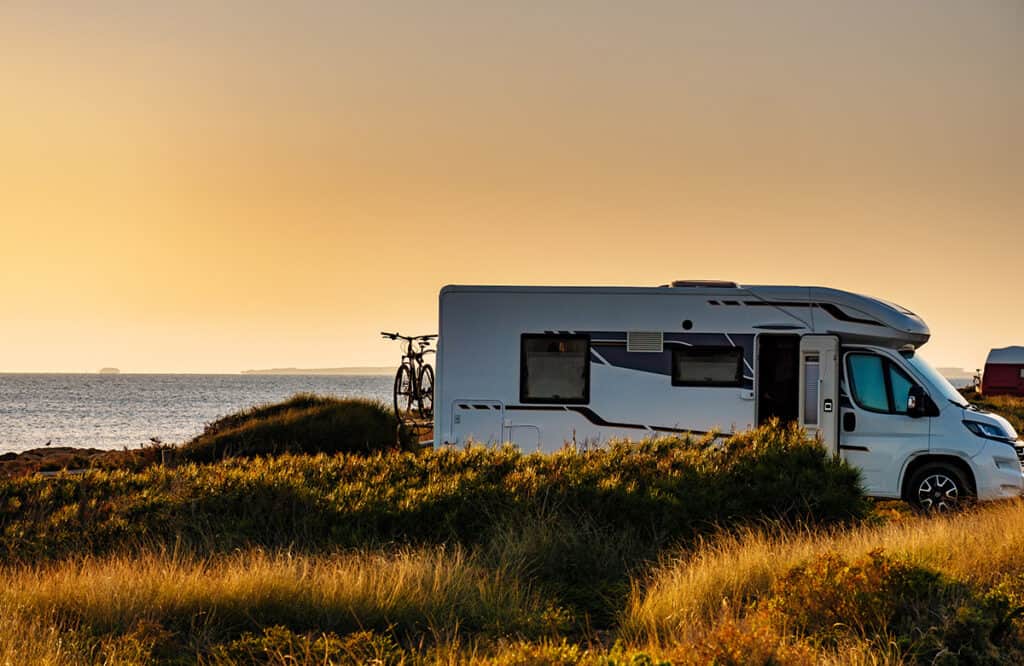
Things you need to drive in Portugal- safety gear
These are the things you MUST have with you when you’re motorhome or campervan touring in Portugal.
- Hi-vis reflective jackets – not as strict as in France, but you must wear them on the side of the road or hard shoulder or risk being fined.
- Warning triangle
- Headlight beam converters– if you have a UK vehicle. These must be fitted before you drive in Europe. (If you have a vehicle which allows you to adjust the beam automatically for European driving, you won’t need these.)
- Car sticker attached to the back of vehicle or on reg plates. (NOT the EU sticker anymore!)
- A spare wheel (and tools to change it!), or a tyre repair kit.
- If you wear glasses you MUST carry a spare pair
TOP TIP: Buy these essentials for driving in Portugal in advance. If you wait until you’re at the ferry/ tunnel, you could spend THREE times as much! See the latest deals and best prices here
Using a Dash-cam in Portugal
This warrants its own section, because so many people don’t realise the law. Using a dash-cam in Portugal is illegal. Not just that, but OWNING a dash-cam is illegal in Portugal.
Now, I don’t think for one second that the police are going to stop and search you looking for a dash-cam, but I suggest you put it away safely before you get to the border- just in case.
Road trip accessories you MIGHT need when campervanning in Portugal
The following kit are things you might need to carry in your car, motorhome, caravan or campervan, depending on when you are planning your road trip in Portugal.
You will probably want an automatic toll tag- as many of the motorways insist on them before you can use the road. You can avoid these, but it’s a lot of extra driving. More on that in the ‘toll’ section.
- Winter tyres are not compulsory but snow chains are mandatory where signage indicates.
- Red/ white warning board sign – for bike racks or anything overhanging the end of the motorhome or campervan. Lines must point into the middle of the road. Again, this is a legal requirement in Spain, but worth having in Portugal
- First aid kit – not compulsory in Portugal (unlike many countries in Europe) but worth carrying. Find out what we carry in our European first aid kit here
- Spare bulbs for all lights in the vehicle
- Torch
- Fire extinguisher
- Road Trip snacks and water- just in case!
Motorhomes or campers with a total train length of over 12m
If you’re travelling in/ through Spain and your outfit exceeds 12m, you need to have marker boards fitted to the back of your vehicle. You can either have two small boards or one large board but they must be placed at the back of the outfit between 50cm and 150cm off the ground.
Your marker board must:
- be yellow in the centre with a red outline
- be made out of aluminium
- be manufactured to ECE70 standard
This is not law in Portugal, but I fail to see how you’re going to get your 12m vehicle train to Portugal without driving through Spain…
Planning to take your motorhome to Europe?
GUIDE: Stop the overwhelm with our step-by-step guide. Contains eBook, checklists and more. Complete Europe Motorhome Travel Toolkit
CHECKLIST: Don’t forget to grab your FREE Europe motorhome travel checklist HERE
GEAR– If you need any motorhome gear for touring Europe, here’s what we recommend.
What documents do you need to road trip in Portugal?
If you’re driving in Portugal, you need to carry the following documents:
- Passport (or identity card)
- Driving licence (check it is in date!)
- Motorhome Insurance documents- check you are covered for driving in Europe
- Breakdown cover
- Vehicle V5 logbook (which must show your correct address)
- Vehicle must be legally taxed and MOT’d
- Trailer certification (may also need a document from your insurer)
- International Driving Permit if required
- Personal travel insurance
Do I need a green card to drive in Portugal?
Most UK license holders don’t need a green card to drive in Portugal. You may need one if you have a trailer- please check with your insurer.
Do I need an international driving permit to drive in Portugal?
Most UK citizens do not need an IDP to drive in Portugal, as long as you have a card driving licence issued in the UK (in date, of course!)
You might need one if you have:
- a paper driving licence only
- a licence issued in Gibraltar, Guernsey, Jersey or the Isle of Man
(If you do need an IDP, here’s an in-depth guide on how to get an International Driving Permit and which one(s) you need from a UK post office.
Touring Portugal in a campervan- Other useful things you might need
We’ve been touring Europe in our motorhome for several years. We’ve tried all sorts of kit- some useful, some not so much.
Here is a list of things we highly recommend when motorhoming in Portugal, but which are NOT essential:
- Motorhome WiFi– learn our favourite way to get internet on the road
- Toll pass (see below)
- TV- If you’d like TV in your motorhome or camper, here’s how to get it.
- Motorhome sat-nav– get one you can enter your motorhome dimensions into, like these
- Motorhome security camera– this thing is GOLD for allowing us to go exploring and leave the van for a short time.
- Inverter
- An awesome motorhoming logbook to record and remember your adventures!
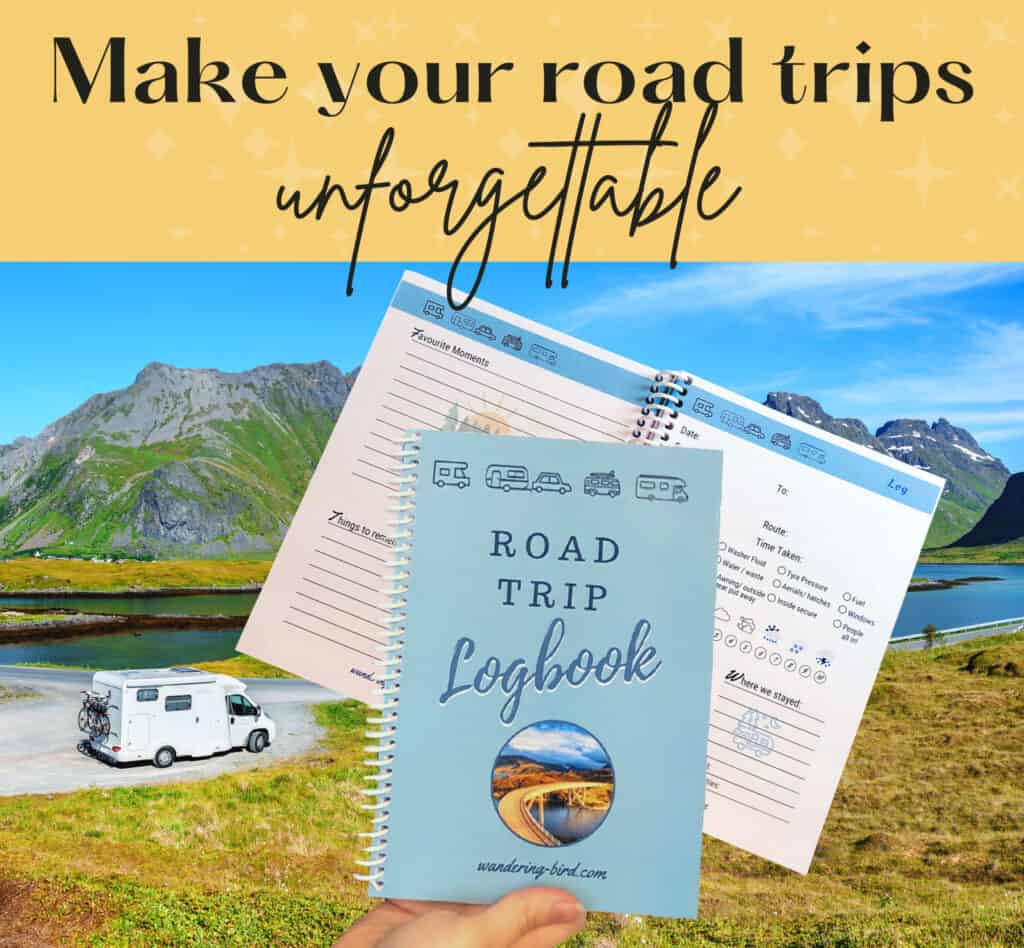
Motorhome stopovers & overnight parking in Portugal
In Portugal, there are several types of motorhome and campervan stopovers you can use.
- Campsites
- Aires
- Free/ approved motorhome parking schemes
- Wild camping in Portugal for vans
Portugal Camping sites for motorhomes, campervans and caravans
It’s easy to find motorhome campsites in Portugal and they’re much like campsites anywhere else in Europe. Some are rustic and have very basic facilities, while others are designed for long-term visitors and have entertainment, clubs, pools and bars!
Campsites in Portugal are often a lot cheaper than you might expect, especially if you’re used to other countries in western Europe. Some are as little as 2€/pp/ night- but they are very basic.
Many campsites have either long-term residents who live in their motorhomes in Portugal, or have permanent statics or caravans which the owners visit when they can.
There is often one ‘main’ or municipal campsite in each town, which is signposted using blue and white signs to help you find it. Expect to show your passport or identification on arrival and many places require you to leave one passport behind the reception.
If you’re travelling out of high season and are planning to use campsites, we highly recommend buying an ACSI CampingCard membership, but be aware that some campsites either shut during the winter or are booked up entirely months in advance, so you may wish to book one too.
Also, many campsites put ACSI users on ‘lesser’ pitches (either bad view or no electric or drainage). You can ask for a different pitch, but will usually need to pay a supplement which wipes out the ACSI discount! This is especially common on the coast in the Algarve.
At some campsites, you will need to pay extra for shower or electric usage. Be warned- the hot water in the shower is on a timer- usually between 3-5 minutes per token.
If you’re campervanning in the Algarve, this is a great resource to help you find places.
TOP TIP: If you’re planning to stay in one area for a long time (30+ days), negotiate a special rate with the campsite directly. Most of them have some sort of discount- some are as little as £10/ day, including electric.
Aires in Portugal
Aires are just approved motorhome overnight parking places- often provided and maintained by the local commune. Unlike if you go motorhoming in Italy, aires in Portugal are usually just called aires, like in France or Spain (they’re called Sostas in Italy)
There aren’t quite as many aires in Portugal as in France and they’re often a little more out of the way, but the network is still very useful and easy to use.
READ MORE: Learn how we find and use aires and approved free overnight motorhome stopovers across Europe
There are a mixture of private and municipal motorhome aires in Portugal. Private aires are very similar to a campsite, and often you can stay for as long as you wish (unlike if you go motorhoming in Germany, where 48h is generally the max).
Municipal aires are sometimes called ASAs and are approved overnight motorhome stopovers, provided by the local council. At these, there is a restriction of 2-3 nights maximum in one place.
You cannot book motorhome aires in advance- it’s first-come, first-served, so if you’re visiting at peak times you might feel happier booking a campsite so you’re assured of somewhere to stay.
A good tip is to try and arrive AT your destination just before lunchtime. Many people move on after. a lazy morning, and stop en-route, so you have the best chance of finding a spot around this time, but that’s when the day is at its hottest, so be careful.
There are very few facilities at an aire. You should be able to get water and empty waste, but don’t expect restaurants, pools or entertainment areas. Also, do not hang out washing, get your awning out or put chairs out- this is camping and is not allowed- the police will stop and ask you to move.
It’s always worth investing in a book of aires, as well as an online app- just in case you find yourself without internet in your motorhome (or without a wifi signal). Of course, the downside with any book is that it goes out of date, but don’t worry if it’s only a year or two out- most information about aires won’t change too much.
Other approved motorhome stopovers and parking in Portugal
Portugal EasyCamp is a scheme which connects local business owners to motorhomers and campervanners looking for safe places to stay overnight. If you’d like to avoid busy campsites and aires, but don’t want to risk wild camping, this might be the option for you.
It works very similarly to France Passion, with one big difference- you have to go online and buy the product or experience BEFORE you visit the location. You can then head there and stay for up to 24 hours.
READ MORE: How to make the most of Portugal EasyCamp
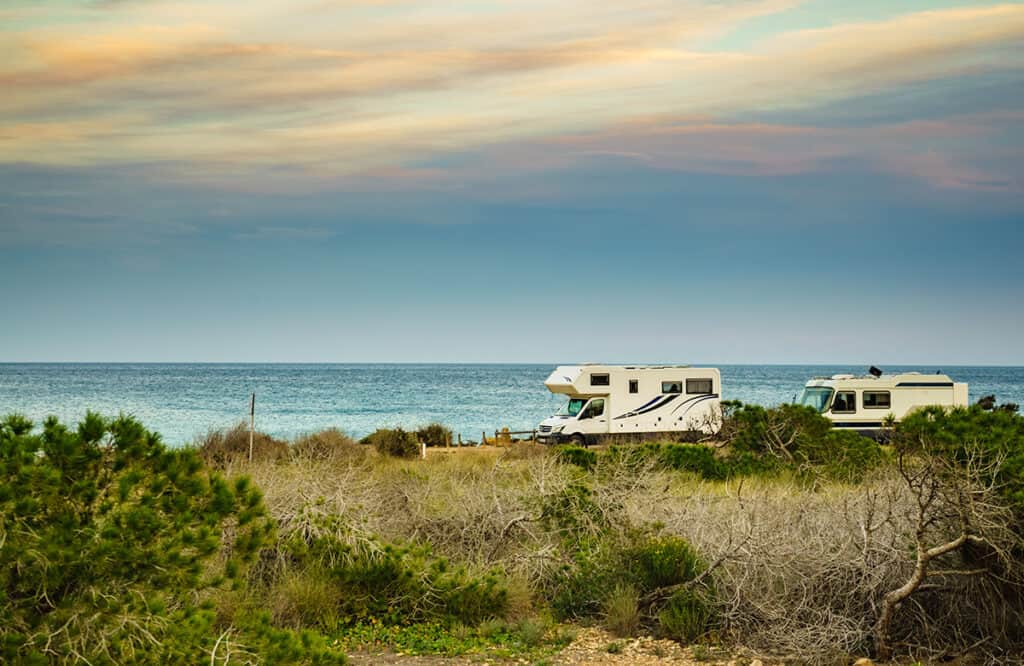
Wild camping in Portugal for motorhomes and campervans
Usually, I am the first person to promote and encourage responsible motorhome wild camping. We enjoy it immensely and have done it across most of Europe with any issue.
Portugal has long been the destination for campervanners and motorhomers looking to stay off-grid, despite the fact that wild camping in Portugal has ALWAYS been illegal.
However, the country has been overwhelmed by the sheer numbers of vans in recent years (much like wild camping with a motorhome in Scotland) and they have had to deal with years of abuse and mistreatment.
The problem with many of the campervans who visit Portugal is that they don’t have their own facilities onboard- and people have been leaving waste (of the human kind) all over the place. 🙁
On top of that, many wild camping spots don’t have any facilities, so people have been leaving piles of rubbish and even emptying their chemical toilets into bushes or over the countryside. Times this by thousands upon thousands of vanlifers and it’s no wonder the Portuguese government are trying to protect their country.
Is Motorhome campervan Wild camping legal in Portugal?
In January 2021, the Portuguese government passed a law which changed the highway code so campervans, motorhomes and caravans had to stay on an official site. It was prohibited to park and stay by beaches and places marked as unauthorised and it is also prohibited to stay overnight in any car park not expressly designated for caravans, motorhomes or campervans.
Wild camping was always illegal in Portugal, but was tolerated or overlooked if people were discreet although the rules were changed in May 2020 to prohibit campervan parking near beaches in Portugal.
Sadly, Portugal has been abused in recent years by vans wild parking. In early 2021, Portugal banned motorhomes and campervans from staying anywhere apart from campsites or aires. Wild camping was never legal to begin with, and was already banned completely near the coast, but they bought in fines.
I’ll be honest, I’ve been appalled by the pictures of waste and vandalism left behind by so many thoughtless and selfish idiots and I can’t blame the Portuguese for trying to stop it.
At the same time, I’m sad that a few idiots have ruined it for the many responsible and conscientious campervanners – we’re not all dirty horrible vandals.
Thankfully, in summer 2021, they amended the law BACK to allow “overnight stays in motorhomes approved by the Institute of Mobility and Transport for a maximum period of 48 hours”.
What this basically means is that motorhome/ campers with their own facilities like a fitted toilet are allowed to wild camp. Of course, PLEASE don’t leave waste (of any kind!) behind- we don’t want them to change back again!!
Wild camping is still banned near the coast, in National parks and near protected areas. Violations can result in a fine between 120 to 600€.
Also, there probably aren’t enough campsites or Aires to deal with the number of people who visit in vans each year. There will need to be new facilities, more waste and service points and a new infrastructure and I’m not sure who, when or how it’s going to happen.
Motorhome and campervan service points in Portugal
There are motorhome service areas spread around the country. Many are on municipal aires and facilities include drinking water supply points and places to dump dirty water(grey waste) and chemical toilet (black) waste. These areas could also have electricity power points for charging the batteries of camper vans and motorhomes.
We find them using Park4night, but you can also use this website (although it is in Portuguese!)
Driving tips for Portugal
Portuguese drivers have a luke-warm reputation- mainly because the country has one of the highest accident rates in Europe, but honestly they’re probably better than the Italians. Having said that, they rarely use indicators and will regularly cut wildly across several lanes to reach an exit. So expect the unexpected and you’ll be fine.
Ok, let’s deal with the basic rules and some tips for motorhoming and road tripping in Portugal:
- Portugal drives on the right
- Vehicles coming FROM the right have priority at junctions
- On roundabouts, vehicles already on the roundabout have right of way.
- Seatbelts are compulsory
- Speeds are in km/h, not mph (you might want to change the setting on your motorhome sat-nav)
- You do not need to have driving lights on during the day
- Handsfree kits are allowed
- It is forbidden to use a dashcam or radar detector for speed cameras
- Road surfaces are generally pretty good in towns and cities, but can be bad in the countryside.
- Avoid cities if you’re driving in a motorhome- many of them are too crowded and the streets are just not cut out for large vehicles. Park outside and use public transport to get in.
- Trams always have priority everywhere- keep eyes in the back of your head if you’re driving near a tram network.
- Emergency vehicles and military vehicles have priority over other road users.
- You may carry a load, such as bikes on a rack, extending by up to 10% of the length of the vehicle to the rear. The load must be indicated by a board/ panel with diagonal red and white stripes– this is legal for Spain, but worth having in Portugal.
- Bikes or a load being carried must NOT be wider than the vehicle
- Helmets are compulsory if you are motorcycling in Portugal
- Winter tyres are not compulsory but snow chains are mandatory where signage indicates.
- There is no border control between Spain and Portugal – you can just drive right in
Roads in Portugal
There has been a lot of money spent in recent years to build new roads (hence all the tolls!) Most of the major roads have been resurfaced and are pretty good, but there are many older roads in more rural areas which are in poorer condition. You will be fine to drive them with a motorhome or camper, but slow your speed and drive with care.
Traffic Lights in Portugal
Traffic lights use the 3 colour system. There is no amber signal after the red, and a flashing amber light indicates “caution”. A flashing or constant red light indicates “stop” and is used near level crossings and to give warning of an obstacle.
Speed Limits in Portugal (unless otherwise signed!)
Breaking the speed limit could result in either an on-the-spot or an automatic fine being sent to you.
Cars and vehicles under 3.5 tonnes:
- 120 km/h (74mph) on motorways and some dual carriageways
- 100km/h (62mph) on major roads
- 90 km/h (55 mph) on minor roads (out of town)
- 50 km/h (31 mph) in built-up areas
Motorhomes and Campervans weighing over 3.5 tonnes:
- motorways 100km/h (62mph)
- major roads 90 km/h (55 mph)
- minor out-of-town roads 80 km/h (50 mph)
- urban areas- 50 km/h (31 mph)
Motorhomes with trailers or caravans
- motorways 100km/h (62mph)
- major out-of-town roads 80 km/h (50 mph)
- minor out-of-town roads 70 km/h (44 mph)
- built-up areas- 50 km/h (31 mph)
Speed Cameras in Portugal
Many roads have automatic speed cameras on in Portugal and they’re quite happy to send tourists a fine through the mail.
You might also find random traffic lights, which turn to red in the middle of nowhere if you’re speeding and make you wait for a couple of minutes before turning to green so you can move off again. These are surprisingly effective!
Drink Drive law in Portugal
Alcohol laws are stricter in Portugal than the UK. The legal limit is 0.05% blood alcohol (the UK is 0.08%) and applies to the driver of any motorised vehicle. If you’ve had your license for under 3 years, the limit is 0.02%
– A blood alcohol level between 0,5 g/l and 0,8 g/l is considered a serious offence, and it is sanctioned with a driving inhibition between 1 month and a 1 year and a fee payment of an amount from 250 up to 1.250 euros.
– A blood alcohol level between 0,8g/l and 1,2g/l is a very serious offence, sanctioned with a period of driving inhibition between 2 months and 2 years and a fee payment of an amount from 1.250 up to 2.500 euros.
– A blood alcohol level of 1,2g/l or more is considered a crime, that can be punished with imprisonment up to 1 year or fee penalty up to 120 days, and driving inhibition between 3 months and 3 years.
Low Emission zones in Portugal
Portugal has a low emission zone (LEZ) in Lisbon. It’s split into 2 zones – Zone 1 and 2. About 33% of the city is inside it, so be careful if you drive in. Find out more about the Lisbon Green air zone here.
Click here for more detailed information about how to find zones across Europe.
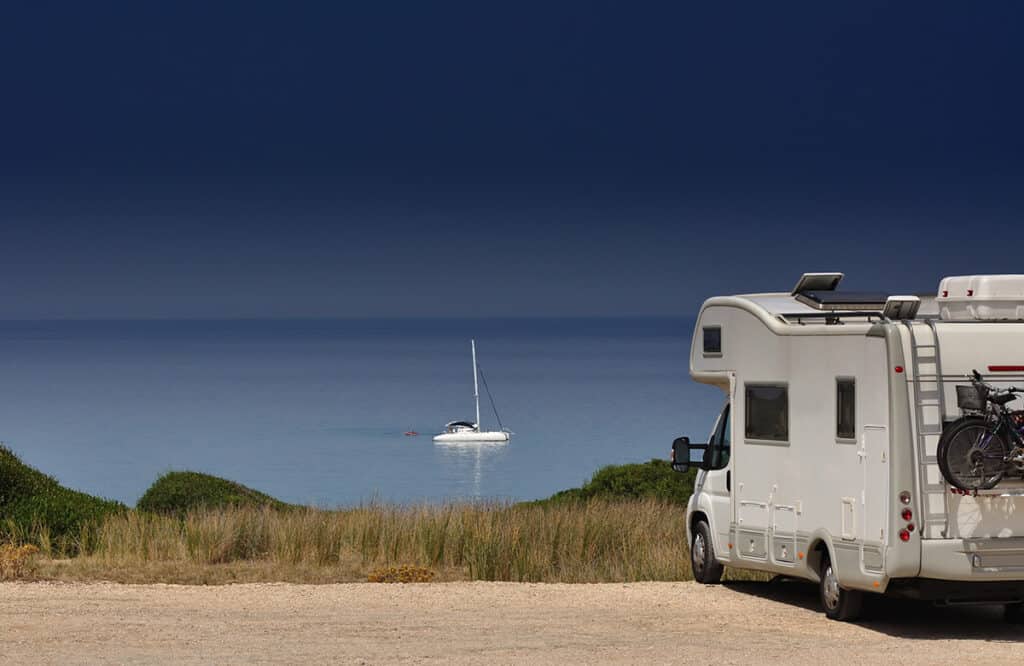
Tolls in Portugal
There are two types of toll in Portugal- both on motorways:
– traditional motorways with toll booths, where payment is made by cash, bank card or electronic tolls.
– Purely electronic toll motorways. In order to use these roads, you MUST have an electronic device in your vehicle.
Easy Toll
Easy Toll uses your bank card and number plate to take payments. You enter your card details at a sign up location on the border and get a photo of your registration plates taken. The system will then deduct toll payment from your bank card every time your vehicle passes a toll gate.
Signing up costs 0.74 euros, plus a 0.32 euro administrative fee.
This method is valid for 30 days, and the tickets issued at the toll must be kept as proof in case of a problem. You can find out more on the Portugal tolls website.
Via Verde
If you regularly use toll roads, it may be worth signing up to the Via Verde scheme which takes you through the fast lane without having to stop and pay.
Via Verde is the only system which works on ALL the Portuguese motorways. It also covers a decent section of Spanish toll roads too. You buy a transponder and then get charged or what you use. The nice thing about them is that once you have one, it doesn’t expire, so it’s valid for whenever you return to Portugal.
e-Movis
Personally, we use e-Movis for tolls all over Europe and we’ve never had a problem. These allow you to use the VIA-T lanes in Portugal
It’s worth noting that you need a DIFFERENT e-Movis tag for Spain and Portugal (one does both countries), than you do for France. So if you’re driving from the UK to Portugal, you will need at least 2 e-Movis toll tags in your motorhome and you’ll need to remember to switch them over.
Pre-paid Toll Card
This system is relatively straightforward and handy instructions are written on each card.
You buy a pre-loaded card with either 5, 10, 20 or 40 euros. You then activate the card with an SMS message, using the code printed on the card and the licence plate of the vehicle.
There is a service cost of 0.74 euros for each card purchased.
If you head home with credit still on your toll card you can get this refunded – just return it to the main post office in Portugal, the CTT.
There is also a Toll Service, which is a pre-loaded card with unlimited use for 3 days or previously defined journeys.
You can purchase these at the CTT post office, online at www.tollcard.pt or at various service areas.
This website also shows how much each toll road will cost, so might be worth a look when you’re planning your route through Portugal.
Planning to take your motorhome to Europe?
GUIDE: Stop the overwhelm with our step-by-step guide. Contains eBook, checklists and more. Complete Europe Motorhome Travel Toolkit
CHECKLIST: Don’t forget to grab your FREE Europe motorhome travel checklist HERE
GEAR– If you need any motorhome gear for touring Europe, here’s what we recommend.
Driving in Portugal- what to do in the event of a road traffic accident
You should have a European Claim Form provided by your insurer before you leave. In the event of an accident, all parties complete and sign the form at the scene and then send a copy to your insurer for assessment.
What to do at the scene:
- Stop your vehicle immediately but safely- out of the flow of traffic if possible.
- If a vehicle is blocking the road, use hazard lights and put the red warning triangle 30 metres from the scene to warn approaching traffic
- Exchange your details with the other involved parties. Be sure to get:
- Name and address of all the people involved in the accident
- Vehicle registration numbers of all parties
- Insurance company details of all parties
- Take photos of damage using a camera, GoPro or phone
For more details, read our step-by-step guide on dealing with a road traffic accident in Europe
Other essential tips for campervanning in Portugal
Petrol and Diesel
Petrol and diesel are widely available. Many fuel stations are 24h on the main roads and are self-service with card machines.
Petrol is Sem chumbo (95 / 98) – Green handles on pump
Diesel is Gasóleo or Diesel. Black or yellow handles on pump
Carrying fuel in cans is NOT allowed, even in small amounts, so be careful if you have a motorhome generator.
Some places are 24h pay at the pump, but may require you to go into the shop and pay the cashier either in advance or after you’ve filled up- there will be a sign to tell you what to do. (Leave your car in front of the pump and make a note of the pump number.)
You can pay using cash or a credit card. Many places do NOT take American Express. You can usually use your UK cards without a problem.
NOTE: It is illegal to run out of petrol when crossing Lisbon’s mile-long 25 de Abril bridge.
LPG Gas
LPG (GPL) can be found at many petrol stations. There are actually more places than in Spain. If buying from a petrol station, you may need to wait for an attendant to turn the system on for you.
You can find places which sell LPG using MyLPG.eu
Remember, if you don’t have refillable gas bottles, you will be unable to buy a gas bottle which fits straight onto a UK system- you need a new pigtail. Portugal mainly uses the euro connector.
READ MORE: How we find motorhome LPG or bottles while touring Europe
Campervanning in Portugal- security
Portugal has a lower crime rate than many other countries in Europe, but vehicle break-ins do happen, as does petty theft and pickpocketing.
We highly recommend paying extra attention to your motorhome security when travelling in Portugal. You might even wish to fit an extra camper habitation door lock and never leave your vehicle unattended in an unsecure area.
READ MORE: Essential tips for protecting your van at home and on the road
More useful things to know about vanlife in Portugal
Some more tips to help you enjoy your time in Portugal.
Emergency Numbers: 112 will get you everything
Language– The Portuguese are pretty good at languages. Portuguese is spoken, along with Spanish. Many of the younger generation speak English well.
Currency– Euro
Cards– most major credit and debit cards are accepted. American Express is only taken in large stores (not at tolls and often not at fuel stations)
Timezone– GMT (same as UK- yes, Spain is in a different time zone!)
Mobile Phone and Internet – It’s usually possible to use your UK phone and data in Portugal, but there will likely be a charge to use your UK phone data abroad. Please check with your UK network provider.
Tipping- Tipping is not expected but appreciated. 5% – 10% in restaurants is standard if you are happy with the service.
Shops– Food prices are pretty inexpensive. Traditionally, shops are open from Monday to Friday, from 9 or 10 a.m. to 7 p.m. Some close for lunch from 1 to 3 p.m. On Saturdays, shops generally close at 1 p.m. though in city centres some are open in the afternoon. Many shops close on Sundays. Bigger supermarkets may be open, but will close at lunchtime.
Don’t confuse Portugal with Spain- the Portuguese are very proud of their culture and heritage. They enjoy life at a slower pace and there are plenty of queues.
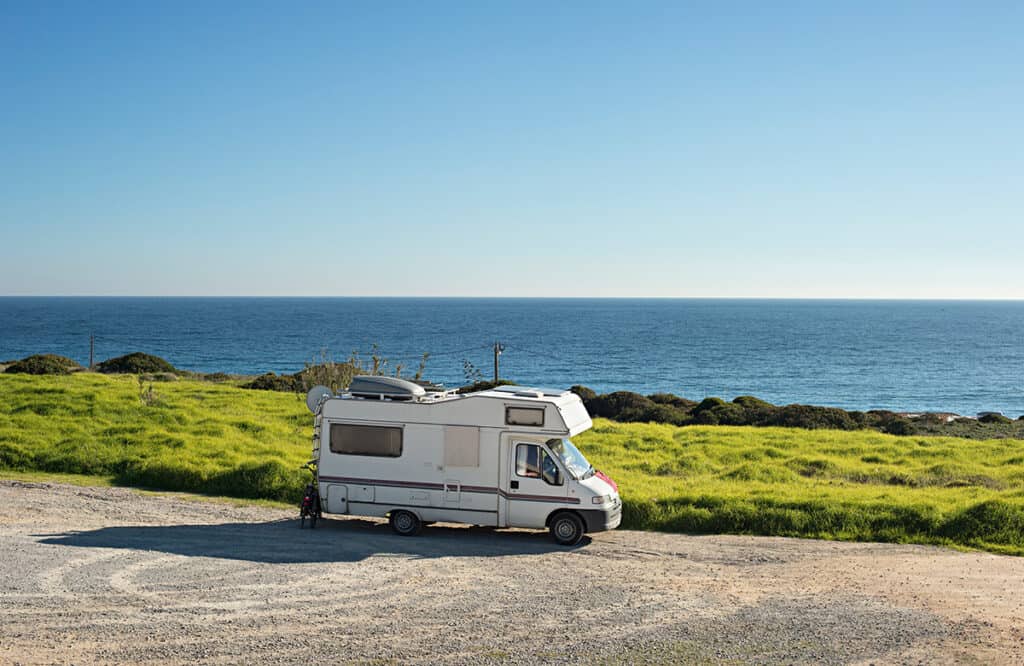
Food and Drink in Portugal
Markets are the hub of life in Portugal. You’ll find one in every village, town and city, with a range of local produce for sale. Many people in Portugal only ever eat seasonally, so local dishes will change depending on time of year.
Make sure you have cash (including small change) and bring your own bags. Be warned- the markets are often held in the biggest car park in town- which is often where the motorhome parking is. Pay attention to the signs in these car parks- they will say when the market is and if you are unable to park on certain days.
Local dishes in Portugal to try include:
- pastel de Belém/ pastel de nata- DELICIOUS custard tart
- Francesinha – ham and cheese sandwich
- Caldeirada de Peixe -stewed fish
- Salt cod or bacalhau
Touring Portugal with a dog
Portugal is slowly becoming more dog-friendly. Dogs are now welcome in cafes and restaurants and are allowed on trains- make sure you have a muzzle and their paperwork.
Read more: changes affecting travelling to Europe with a dog after BREXIT
They are not allowed on many beaches in summer and are not allowed into public places like museums. Small dogs in crates are allowed on buses and trams; large dogs are unwelcome on most of them.
Don’t forget how hot it gets in summer and to make sure your dog is comfortable. Do NOT leave them in your motorhome or camper on a sunny day- vans heat up just like cars do. Here are some tips to keep your dog cool on a road trip.
To return into the UK you’ll need a vet on the continent to administer a worming treatment and then allow between 24 hours and 5 days before re-entering the UK.
Be warned, there are MANY stray dogs (and cats) in Portugal- more than I’ve seen anywhere else in Europe. Feeding them is a bit like feeding seagulls…
Using a drone in Portugal
You are allowed to take and fly your drone in Portugal, but they are VERY hot on privacy laws and recording people without their permission- especially if you then upload the footage to Youtube or something.
READ MORE: What’s the best travel drone (and how to choose)
Drones and similar remote-controlled flying devices must be kept at least a minimum 150m from people, vehicles and buildings that are not connected with the drone operator. Flying must happen in daylight only and up to a maximum height of 120m. Never fly closer than 5km to airports. The drone must always remain within the sight of the operator.
Please check for local regulations and military or other special restricted areas where all the aforementioned activities are forbidden by law. Here are current rules.
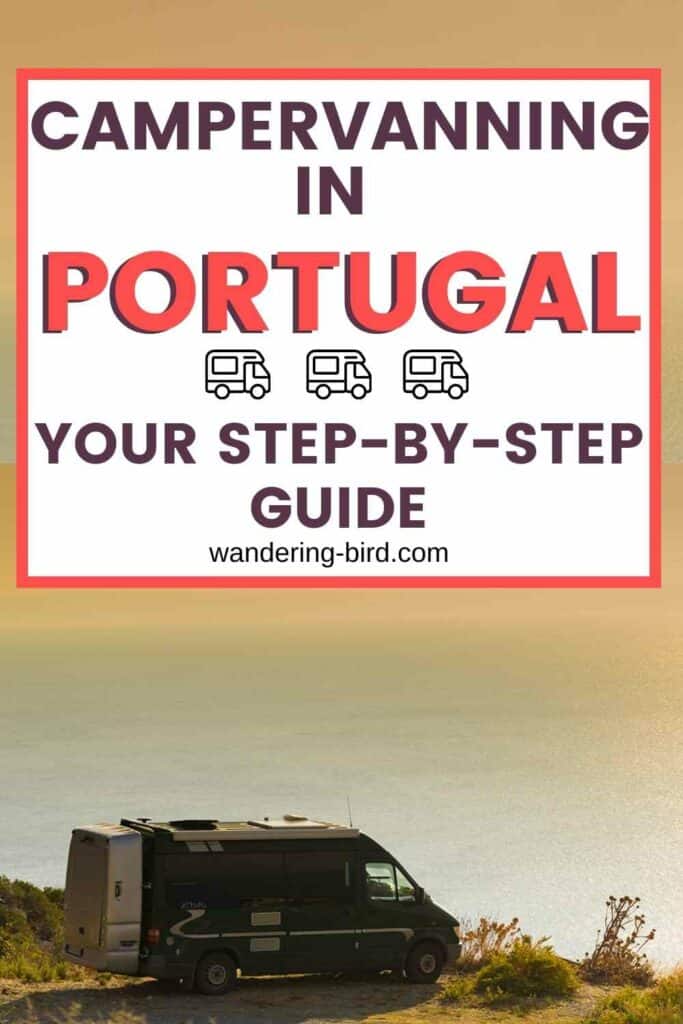
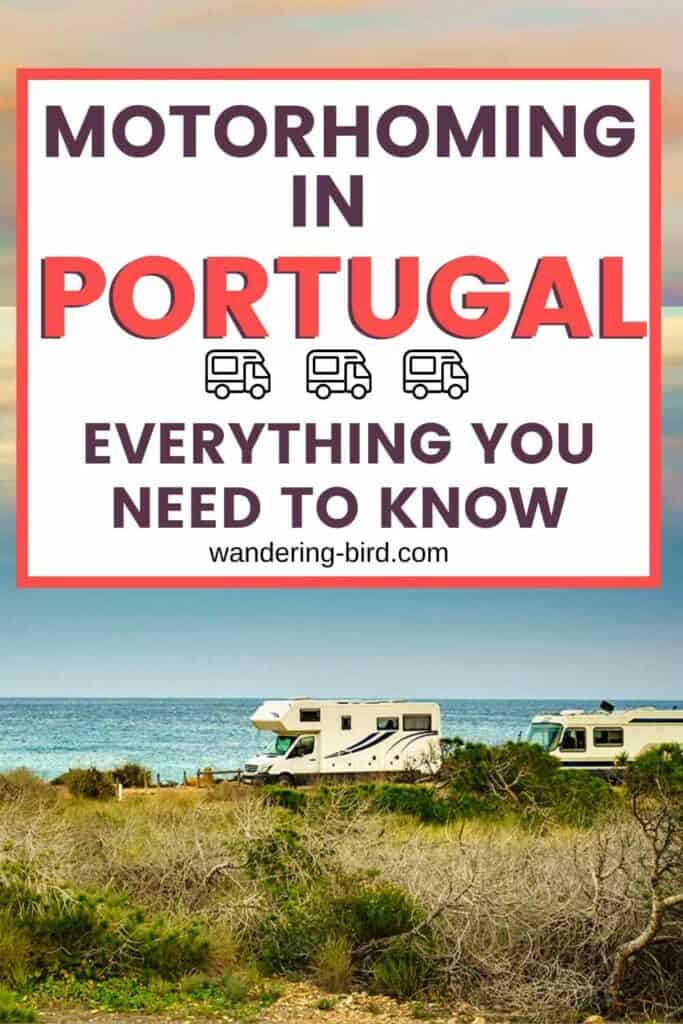

Kat never planned to buy a motorhome. She also never planned to quit her job as an air traffic controller, go touring around Europe in said motorhome, start one of the UK’s largest motorhome travel websites… or get a cocker spaniel.
Find out how she went from stuck in the rat race to being a digital nomad and inspiring thousands of people to have their own epic adventures here.
If you’d like to connect with Kat, send her an email or follow her adventures on social media.
Last update on 2024-04-25 / Affiliate links / Images from Amazon Product Advertising API


